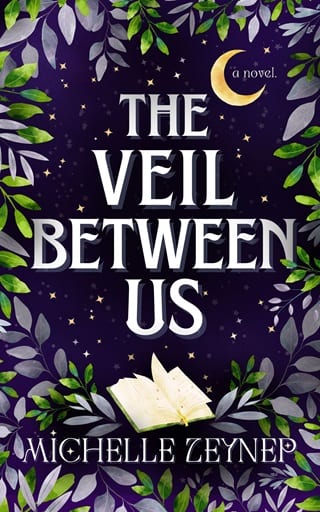6. Chapter 6
Chapter 6
M e : Grandma Lydia says that your presence is required on Thursday evening and that Javier’s presence is requested and preferred, but optional.
Me : I know you are going to ask, and the answer is that she is making lasagna.
Caro : 100% will be there. Javi has work. :(
Me : Booo
Caro : Boooo x1000
Me : Spend the night! Summer besties style!
Me : We can get brunch in the a.m.
Caro : Sold. You know I can’t resist brunch. Prepare yourself for multiple mimosas.
The end of June brings the first heatwave of the summer along with a thick, unmovable wave of sudden humidity. Part of me is glad that I don’t have to do any manual labor with Henry during the two-week-long spell of hot weather. Mostly, I miss him and would prefer working in the heat with him than not seeing him at all.
You’re not missing him , I tell myself. You’re missing having some structure to your schedule. I remind myself of this as I try to create some semblance of regularity in days now unmoored from any schedule, but for the time I spend sifting through documents and stories and memories with Grandma Lydia, but it’s hard to convince myself that it’s true. I struggle to feel like I know how to manage myself, feeling strangely off every morning. I attempt to make morning jogs my new ritual, but I hate them and I abandon the idea after only two sweaty mornings.
Instead, I fall into a pattern of sleeping in after restless nights of strange dreams and midnight family history book creation, followed by afternoons of flitting around the house, doing little chores and other small tasks for Grandma Lydia.
Even though I think about it almost obsessively, I refuse to go back to see for myself if the little house in the woods is still there. If I can’t find it, what will that say about my own memories of the place? And if I do find it, what will I say to Grandma Lydia—about her not wanting to sell the house but feeling like she has to because her mind is going? No, I can’t possibly venture out to check on it myself. If I don’t go, it’s Sch?deringer’s House— neither there nor gone. If I never check, I will never have to deal with the fallout of the Mandela Effect on my own childhood memories and mind. I will never have to lie to my aunts and uncles about my grandmother’s competence or question my own reality.
The dreams are bad enough when it comes to grasping reality. For over a week, they repeat in fragments, never pushing past that moment where the door slams behind us and Henry turns around to look beyond me. It’s not until one particularly warm night, when I’m already tossing and turning and sweaty before I even manage to fall asleep, that the dream goes any further.
In the way of many dreams, it begins in medias res. I’m suddenly no longer standing in the same place I’d been in the previous dream sequences. Instead, I’m in the entry of the greenhouse, watching the scene from the side of the kitchen. Henry is facing a woman. She’s a stranger, somehow someone familiar, but I can’t put my finger on why. Her clothes are almost old-fashioned, her face one I might be able to identify if it wasn’t for the obscuring of the dreamworld.
There’s something about her that is off-putting, something that, even through the muddle of the dream, feels strange. She’s in Henry’s space, leaning toward him with a distinct air of seduction. He’s stepping away from her.
This dream reality is muffling my hearing, I think, until I realize I’m inside the greenhouse, separated from them by a glass door. I’m a dream ghost in their material world, so I don’t need to open it to step through the threshold. At once, their dialogue rushes towards me.
“—it’s a betrayal. It’s not complicated,” Henry says. “I don’t want you.”
“So you’ve said.” The woman’s eyes narrow, lip lifting up in an expression of hatred that would make my skin crawl had I been awake. “It would have really crushed your uncle, you know. Which would have been perfect. No matter. I’ll still do what I came here to do.”
“I don’t need another chance to tell you that I’m not interested. Curse my name, do what you will. I refuse to be a pawn in your strange revenge plot.”
“I will curse more than your name,” she snarls, lifting something up in her hand—a book, small and leatherbound. “‘I will curse you to a life without love. I will curse you to a world without touch. I will curse you to never being able to have or hold what really matters to you. A life in the veil, a—”
“You’re an evil woman, Mallory,” Henry interrupts, disdain clear in his voice. “So, fine, ‘curse’ me.” He holds up his fingers, miming air quotes. “I’m not changing my mind. I’m not—”
The woman—Mallory, he’d said—lunges for him. There’s a flash of metal in the light and Henry shouts, jolting backward—
And I wake up.
A little over two weeks after Henry and I polished off the to-do list, a huge storm blows through the area, bringing thunder, lightning, and a tornado that eats away houses and trailers and trees two towns away. Its only mercy is that it breaks the heatwave we’ve been experiencing. Fortunately, Oak River is mostly unscathed, but the high winds still damage the gutters on the north side of the house.
Truly, the only reason I realize they are in need of repair is because, as I’m rushing out of the house the next afternoon, I notice a sticky note on the glass of the front door.
Rency, Looks like your gutters are damaged. Text me if you need help with the repair. Be well,–H. B.
Below the initials are a phone number. H. B.
Henry.
His handwriting is precise, yet artful. Old-fashioned, almost, and entirely different from the scrawl of the teenage boys I teach and the majority of my male colleagues. Seeing it, formatted like a little letter in sticky note form, makes my heart skip a beat, which makes me feel silly—getting excited over a note in which a guy I barely know offers to do a paid maintenance project for my grandmother’s house is truly ridiculous.
Still, I bring the note into the car with me. Earlier this morning, I’d gotten a voicemail from the lady at the historical society, apologizing for taking so long to get back to me with the newspaper article and letting me know that not only had she been able to find the article, but that she’d also pulled some other documents they had on file for other people in the family and from events near that date. They would be closing early today, the woman had said, so please come to the historical society before two, just in case I want to make any copies or take photos of the items as they are not to leave the building. (Period.)
I stick the note on the dash of my car, snapping a photo and texting it to Caroline before tossing my phone on the passenger seat. It immediately buzzes and doesn’t stop buzzing even as I walk through the alley and to the door of the historical society.
Caro : OMG OMG
Caro : Is the gutter actually broken or is this just an excuse?
Caro : Nvm even if it is broken, it’s still an excuse.
(Missed call from Caro)
Caro : Have you called him? Texted the number?
Caro : Can I text the number pretending to be you?
Caro : Just kidding
(Missed call from Caro) Caro : Really, I was just kidding, Rency. I wouldn’t go that far. Caro : Are you ignoring me after sending me this?
(Missed call from Caro)
Caro : I NEED DETAILS
Me : It’s been exactly thirteen minutes since I texted you that picture.
Caro : I NEED DETAILS
Me : You need a day job. No details yet. I’m about to go on a historical investigation and can’t talk. You still coming over tonight for dinner?
Caro : No chance I’m bailing out now !
When the woman behind the desk of the historical society sees me, her smile is bright. “I’m so glad you were able to come in today, Ms. Faber. I am just tickled by how much we were able to pull for you.”
“Thank you for finding the time,” I say as she guides me across the scuffed wood floor towards an equally scuffed wooden table. “I really appreciate it.”
“The pleasure was mine, actually. It’s always nice when we are able to find more than just the one document for those who stop by.” On the table, there is a manilla folder next to a yellowed newspaper article, which has been slipped into a clear plastic sheet protector. “Here you have the article you requested,” the woman says, gesturing to the page. “And because I had some time after calling you, I went ahead and made a copy of it for you to take home, along with some copies of some other photos and articles I found under those same names.”
“Wow, thank you,” I say, sliding into the chair. “That’s so kind of you.”
“Not at all, really. We just love your grandmother around here—such a lovely woman, really. So please enjoy. If you have anything else you need, let me know, yes? Just don’t forget that we close in an hour.”
“Of course,” I reassure her. These small-town establishments really know how to keep their own hours. I wait until the woman walks away before devouring the article in front of me.
TRAGIC LOSS OF LOCAL MAN ON WEDDING DAY
August 1929
Last Saturday, on the morning of his wedding, H. Bakker, a local man well known to those in town and in the surrounding area alike, was killed by a lightning strike as he walked to his own wedding ceremony.
Witnesses say that the storm was sudden, and before even the first raindrop had fallen, a bolt of lightning hit the man, leaving nothing in its wake.
The article continues, detailing other accounts of the incident, as well as theories and mention of his remaining family, whom the article claims are upstanding members of the community in a range of ways: owning the town grocery store, virtuous farmers, carpenters and churchgoers.
The story includes a photo of the town church but no images of the deceased man himself, his family, or his fiancée.
It’s the final lines, right before the details of the funeral, that give me pause.
“Henry Bakker was a kind man,” his fiancée, Florence Faber, said in an interview. “He might be gone, but his legacy will carry on in our hearts and memories forever.”
Henry Bakker. Seeing the name written out is jarring, even more so with my own right next to it, on the same line. Immediately, I picture the sticky note on the dashboard of my car, my own Henry’s initials written there—also H. B.
It’s not that odd , I rationalize. He said that he was a relative of Karl’s, so of course he would have the same last name. It’s not any more strange than my own name being written right here as well.
Except it was strange, wasn’t it? For both of us to have family names and—again—be aligned in the same moment in history? This other Henry was my great-great-grandmother’s fiancé. They were in love. They were going to get married.
They were going to get married.
Married.
A wedding.
A marriage license.
I signed my great-great-grandmother’s marriage license. She was getting married to Henry Bakker.
I want to laugh, but there is a tightness in my chest and a sinking in my stomach that makes me want to groan instead. I signed my name next to Henry’s on a marriage license. If I did ever manage to go on a date with my Henry, how would I ever explain that? I would seem like a complete psycho.
I’m already feeling embarrassed, imagining what Caroline will say when I tell her later tonight, when I open the manilla folder and my heart nearly stops.
Because there, right on the top of the stack of photocopied articles and archive records and images, is my Henry’s photograph, staring back at me.
 Fullepub
Fullepub 



